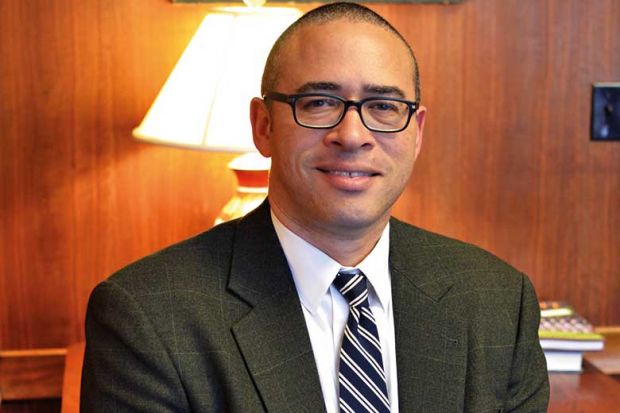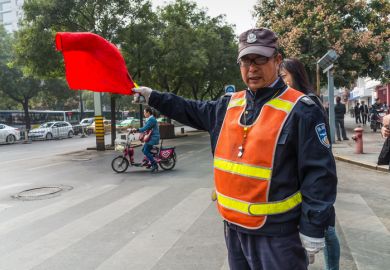Jonathan Holloway, a historian of African American history, has been named the next provost of Northwestern University. He is currently Edmund S. Morgan professor of African American studies, history and American studies at Yale University and dean of Yale College, having served previously as master of Calhoun College. Much of his research is focused on the history of black intellectualism, and his books include Jim Crow Wisdom: Memory and Identity in Black America since 1940. He will take up his new role in July.
Where and when were you born?
Honolulu, Hawaii in July 1967.
How has this shaped you?
My family was in Hawaii because my father was in the US Air Force. I don’t recall those days – I only lived there until I was two – but I have a romantic connection to the island because a number of the cultural practices I experienced growing up (a lot of Pacific-Asian cooking, place names being part of the family lore and so on) came from my family’s time there.
What were your immediate thoughts when you were offered the position of provost at Northwestern?
Disbelief…I tried to play it cool, of course, but I was doing cartwheels in my brain.
What has changed most in higher education in the past five to 10 years?
Speaking mainly from a US perspective, I see two big changes: that leading US universities have become more global, and that the long, steady decline in government investment in higher education has now made its mark. The former is great, the latter is terrible. Internationally, one of the greatest changes has to be the advent of social media because of the way it has changed student life on campus.
What has been the most shocking moment of your academic career?
Last academic year, there was a convulsion on Yale’s campus that was part of an international rise of student protests related to racial and social inequality. It was quite a shock to discover that so many students saw me only as an administrator who must be working against their best interests. If they had read anything I had written or had taken any of my classes, they would have realised that I was aligned with them. At the same time, I did have to be very careful about my public statements because I had to do my best to calm the campus while working towards a more equitable student experience.
What is the biggest misconception about your field of study?
I am a historian who specialises in African American studies. Because this is a field that grew out of student protests and campus unrest in the late 1960s, many people dismiss the field as merely ameliorative; that it is just about politics and not about ideas. To make this claim is to suggest that other fields are somehow different and that they are only about the world of ideas. That’s 1) silly and 2) bad history. All the fields that we see being studied and taught have their genesis in unrest of one type or another.
Which forgotten African American figure in history should everybody know about?
I would have to say Ralph Bunche. It’s strange to think that the winner of the Nobel Peace Prize – for his United Nations mediation work – and one of the most lauded individuals on the planet in the 1950s would qualify as being forgotten, but I believe that most people younger than 40 have no idea who he is. I could point to more anonymous figures in supplying an answer to this question, but given the fact that this world needs great mediators now more than ever, it would be worthwhile to learn more about Bunche and to draw some lessons from his complex life.
In 100 years, how will this moment be discussed in the context of American history?
I would love for this moment to be studied as the era in which global white nationalist movements took their last, desperate breaths, when militarised police forces began to de-escalate and change their tactics, and when a new progressive politics took root that seriously addressed problems related to labour, structural inequalities and the environment. That would be pretty great, but it sure sounds unbelievably optimistic from where I stand right now.
What lessons from history are important to remember today?
Human beings do not like to share, and [they] do nasty things to other humans who are seen as being outside the predominant group. Religious violence, state-sponsored economic inequalities, slavery, racism, sexism…you name it, history is filled with lessons of how people mistreat other people. These lessons are not there to excuse anything, but are there to tell us that there are ways to be better. Unfortunately, most people seem to be committed to being terrible historians.
What is the worst thing anyone has ever said about your academic work?
Easy: that it was “naïve of history”. An anonymous reviewer said that about an essay I was trying to publish in an academic journal. That essay never made it into print, but it became a chapter in my book Jim Crow Wisdom. I hasten to point out that this was a book of history and that it has been well received.
What is something that has changed your way of thinking?
Not a something, but a someone. My wife has made me a better and more generous person in more ways than I’m willing to admit. I am not perfect, but I’m much less flawed because of her.
What advice would you give to your younger self?
Worry less about trying to meet others’ expectations and remember to breathe.
Appointments
Neville Pinto, currently acting president of the University of Louisville, will become the 30th president of the University of Cincinnati. Dr Pinto previously spent 26 years at the University of Cincinnati, ending that spell as vice-provost and dean of the graduate school. In 2011, he moved to the University of Louisville, where he became dean of engineering, initiating the development of a research park. He became interim executive vice-president and provost of the university in 2015. Dr Pinto was born in Mumbai, India, and moved to the US to study for his PhD. His research interests include biomembranes and air and water purification.
Maggie Cusack has been appointed dean of the Faculty of Natural Sciences at the University of Stirling. She is currently head of the School of Geographical and Earth Sciences and professor of biomineralisation at the University of Glasgow. Her research is focused on knowledge of living organisms to advance understanding of fossils, and hence Earth’s geological history. In 2011, she was elected a fellow of the Royal Society of Edinburgh.
Zaffar Moenn Nasar has been chosen as provisional vice-chancellor of the University of the Punjab. Dr Nasar is the former chief of the Pakistan Institute of Development Economics.
Kathleen Ferrier, a former Member of Parliament in the Netherlands, has been appointed a visiting professor on global human rights at the Asian University for Women.
Terence Jagger has been appointed the next chair of the board of governors at Bath Spa University. He is the former chief executive of Crown Agents, an international development company, and is a member of the UK government’s Advisory Committee on Business Appointments.




